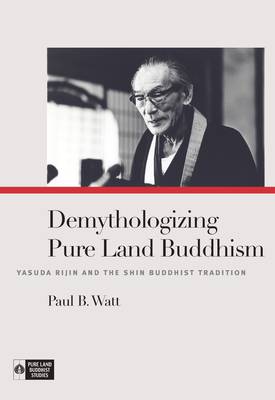
- Afhalen na 1 uur in een winkel met voorraad
- Gratis thuislevering in België vanaf € 30
- Ruim aanbod met 7 miljoen producten
- Afhalen na 1 uur in een winkel met voorraad
- Gratis thuislevering in België vanaf € 30
- Ruim aanbod met 7 miljoen producten
Omschrijving
The True Pure Land sect of Japanese Buddhism, or Shin Buddhism, grew out of the teachings of Shinran (1173-1262), a Tendai-trained monk who came to doubt the efficacy of that tradition in what he viewed as a degenerate age. Shinran held that even those unable to fulfill the requirements of the traditional Buddhist path could attain enlightenment through the experience of shinjin, "the entrusting mind"--an expression of the profound realization that the Buddha Amida, who promises birth in his Pure Land to all who trust in him, was nothing other than the true basis of all existence and the sustaining nature of human beings. Over the centuries, the subtleties of Shinran's teachings were often lost. Elaborate rituals developed to focus one's mind at the moment of death so one might travel to the Pure Land unimpeded, and a rich artistic tradition celebrated the moment when Amida and his retinue of bodhisattvas welcome the dying believer. What is more, many Western interpreters tended to reinforce this view of Pure Land Buddhism, seeing in it certain parallels to Christianity.
This volume introduces the thought and selected writings of Yasuda Rijin (1900-1982), a modern Shin Buddhist thinker affiliated with the Otani, or Higashi Honganji, branch of Shin Buddhism. Yasuda sought to restate the teachings of Shinran within a modern tradition that began with the work of Kiyozawa Manshi (1863-1903) and extended through the writings of Yasuda's teachers Kaneko Daiei (1881-1976) and Soga Ryōjin (1875-1971). These men lived through the period of Japan's rapid modernization and viewed the Shin tradition as possessing existential significance for modern men and women. For them, and Yasuda in particular, Amida did not exist in some other-worldly paradise but rather Amida and his Pure Land were to be experienced as lived realities in the present. In the writings and lectures presented here, Yasuda draws on not only classical Shin and Mahayana Buddhist sources, but also the thought of Nishida Kitarō (1870-1945), the founder of the Kyoto School of philosophy, and modern Western philosophers such as Heidegger, Nietzsche, and Buber.Specificaties
Betrokkenen
- Auteur(s):
- Uitgeverij:
Inhoud
- Aantal bladzijden:
- 196
- Taal:
- Engels
- Reeks:
Eigenschappen
- Productcode (EAN):
- 9780824856328
- Verschijningsdatum:
- 31/01/2016
- Uitvoering:
- Hardcover
- Formaat:
- Genaaid
- Afmetingen:
- 152 mm x 229 mm
- Gewicht:
- 453 g

Alleen bij Standaard Boekhandel
Beoordelingen
We publiceren alleen reviews die voldoen aan de voorwaarden voor reviews. Bekijk onze voorwaarden voor reviews.









